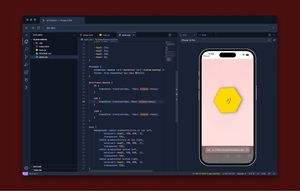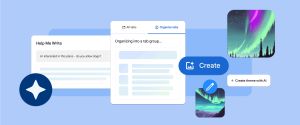News
Google AI Blitz: Project IDX for Dev, Hugging Face Pact, Chrome GenAI Experiments, Text to Video
Google famously issued a "code red" upon seemingly being blindsided by the Microsoft/OpenAI AI partnership and resulting "Copilot" onslaught that gave Redmond clear AI supremacy among the cloud giants. The "code red" is apparently bearing fruit based on a barrage of recent AI-related announcements.
Here's a look at a bevy of developments just in the past week.
Project IDX
Project IDX, debuting last year (see "'Project IDX' Does Experimental AI-Powered App Development in Google Cloud") to help developers create full-stack web and mulitplatform applications in its cloud, received a several enhancements announced just yesterday (Jan. 25). They include:
-
Preview your app directly in IDX with our iOS simulator and Android emulator:"We're bringing the iOS Simulator and Android Emulator to the browser. Whether you're building a Flutter or web app, Project IDX now allows you to preview your applications without having to leave your workspace." See more here.
 [Click on image for larger view.] IDX Emulators (source: Google).
[Click on image for larger view.] IDX Emulators (source: Google).
- Get started fast with a rich library of project templates: "Four of our top ten feature requests have been to support more templates, so we're pleased to share that we've added new templates for Astro, Go, Python/Flask, Qwik, Lit, Preact, Solid.js, and Node.js."
-
Quickly build and customize your IDX workspace with improvements to Nix: "IDX uses Nix to define the environment configuration for each workspace to give you flexibility and extensibility in IDX -- even our templates and previews are configured using Nix to ensure they're working correctly inside IDX." Now users can:
- Customize IDX starter templates easily by leveraging Nix extensibility.
- Reduce the likelihood of errors and write code more efficiently with Nix file editing, including support for syntax highlighting, error detection, and suggested code completions.
- Recover from broken configurations quickly and avoid unnecessary rebuild attempts with major improvements to our environment customization workflow, including seamless environment rebuilds and troubleshooting.
-
Easily build, test, and deploy apps with additional new IDX features and resources:
- Auto-detect network ports needed for applications or services and adjust the firewall settings to permit ingress and egress without any additional configuration on your end.
- Instantly run command-line tools, scripts, and utilities directly within workspace without the need to install them locally on your machine.
- Simplify the process of working with Docker containers and images directly from the development environment by enabling Docker in your dev.nix file.
Hugging Face Partnership
This platform offers a wide range of tools and resources to help users build and deploy their own AI models. Google yesterday announced a partnership to help developers train and serve large AI models more quickly and cost-effectively on Google Cloud in several different ways including:
- Giving developers a way to train, tune, and serve Hugging Face models with Vertex AI in just a few clicks from the Hugging Face platform, so they can easily utilize Google Cloud's purpose-built, end-to-end MLOps services to build new gen AI applications.
- Supporting Google Kubernetes Engine (GKE) deployments, so developers on Hugging Face can also train, tune, and serve their workloads with "do it yourself" infrastructure and scale models using Hugging Face-specific Deep Learning Containers on GKE.
- Providing more open source developers with access to Cloud TPU v5e, which offers up to 2.5x more performance per dollar and up to 1.7x lower latency for inference compared to previous versions.
- Adding future support for A3 VMs, powered by NVIDIA's H100 Tensor Core GPUs, which offer 3x faster training and 10x greater networking bandwidth compared to the prior generation.
- Utilizing Google Cloud Marketplace to provide simple management and billing for the Hugging Face managed platform, including Inference, Endpoints, Spaces, AutoTrain, and others.
Chrome GenAI Experiments
Google on Tuesday announced that "Chrome is getting 3 new generative AI features."
 [Click on image for larger view.] Chrome GenAI Experiments (source: Google).
[Click on image for larger view.] Chrome GenAI Experiments (source: Google).
The features include:
- Smartly organize your tabs: "With Tab Organizer, Chrome will automatically suggest and create tab groups based on your open tabs."
- Create your own themes with AI: "You'll be able to quickly generate custom themes based on a subject, mood, visual style and color that you choose -- no need to become an AI prompt expert!"
- Get help drafting things on the web: "In next month's Chrome release, we'll launch another experimental AI-powered feature to help you write with more confidence on the web -- whether you want to leave a well-written review for a restaurant, craft a friendly RSVP for a party or make a formal inquiry about an apartment rental."
Text to Video
"We introduce Lumiere -- a text-to-video diffusion model designed for synthesizing videos that portray realistic, diverse and coherent motion -- a pivotal challenge in video synthesis," Google says of the Google Research project described as "A Space-Time Diffusion Model for Video Generation" on its site. Google pointed to research on the tech-heavy project.
 [Click on image for larger view.] Text to Video (source: Google).
[Click on image for larger view.] Text to Video (source: Google).
In layperson's terms, it can generate images in response to text prompts or user-supplied images. The site lets users hover over videos to see the prompts that generated them ("Toy poodle dog rides a penny board outdoors").
It can also do stylized generation, video stylization, cinemgraphs and inpainting, which are explained in the announcement. It's not yet available to the public.
Previous Efforts
This isn't the first time Google announced a barrage of AI-related development, as such efforts data back at least to last May (see "AI Onslaught from Google Challenges Microsoft/OpenAI Hegemony"). Stay tuned for more developments in this rapidly growing and changing space.
About the Author
David Ramel is an editor and writer at Converge 360.